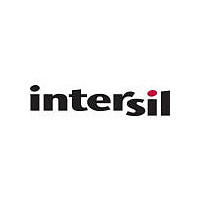ISL6160EVAL2 Intersil, ISL6160EVAL2 Datasheet - Page 6

ISL6160EVAL2
Manufacturer Part Number
ISL6160EVAL2
Description
EVAL BOARD FOR ISL6160/HIP6006
Manufacturer
Intersil
Specifications of ISL6160EVAL2
Main Purpose
DC/DC, Step Down
Outputs And Type
1, Non-Isolated
Voltage - Output
5V
Current - Output
3.5A
Voltage - Input
5V, 12V
Regulator Topology
Buck
Board Type
Fully Populated
Utilized Ic / Part
HIP6006, ISL6160
Lead Free Status / RoHS Status
Contains lead / RoHS non-compliant
Power - Output
-
Frequency - Switching
-
complete its cycle. Figure 4 shows this operation with an
overload condition. Note that the inductor current increases
to over 15A during the C
over-current trip. The converter dissipates very little power
with this method. The measured input power for the
conditions of Figure 4 is 2.5W.
The over-current function will trip at a peak inductor current
(I
where I
- typical). The OC trip point varies mainly due to the
MOSFETs r
in the normal operating load range, find the R
from the equation above with:
For an equation for the ripple current see the section under
component guidelines titled ‘Output Inductor Selection’.
A small ceramic capacitor should be placed in parallel with
R
presence of switching noise on the input voltage.
Application Guidelines
Layout Considerations
As in any high frequency switching converter, layout is very
important. Switching current from one power device to
another can generate voltage transients across the
impedances of the interconnecting bond wires and circuit
traces. These interconnecting impedances should be
minimized by using wide, short printed circuit traces. The
critical components should be located as close together as
possible using ground plane construction or single point
grounding.
Figure 5 shows the critical power components of the
converter. To minimize the voltage overshoot the
interconnecting wires indicated by heavy lines should be part
of ground or power plane in a printed circuit board. The
components shown in Figure 6 should be located as close
together as possible. Please note that the capacitors C
and C
Locate the HIP6006 within 3 inches of the MOSFETs, Q1
and Q2. The circuit traces for the MOSFETs’ gate and
source connections from the HIP6006 must be sized to
handle up to 1A peak current.
Figure 6 shows the circuit traces that require additional
layout consideration. Use single point and ground plane
construction for the circuits shown. Minimize any leakage
I
1. The maximum r
2. The minimum I
3. Determine
PEAK
PEAK)
OCSET
temperature.
where ∆I is the output inductor ripple current.
O
=
OCSET
determined by:
each represent numerous physical capacitors.
to smooth the voltage across R
I
-------------------------------------------------- -
OCSET
DS(ON)
r
DS ON
is the internal OCSET current source (200µA
I
PEAK
•
(
R
OCSET
variations. To avoid over-current tripping
DS(ON)
OCSET
)
for I
SS
PEAK
from the specification table.
at the highest junction
charging interval and causes an
6
>
I
OUT MAX
(
OCSET
)
+
OCSET
(
∆I
) 2 ⁄
in the
resistor
,
IN
HIP6006
current paths on the SS PIN and locate the capacitor, C
close to the SS pin because the internal current source is
only 10µA. Provide local V
GND pins. Locate the capacitor, C
to the BOOT and PHASE pins.
Feedback Compensation
Figure 7 highlights the voltage-mode control loop for a
synchronous-rectified buck converter. The output voltage
(Vout) is regulated to the Reference voltage level. The error
amplifier (Error Amp) output (V
oscillator (OSC) triangular wave to provide a pulse-width
modulated (PWM) wave with an amplitude of V
PHASE node. The PWM wave is smoothed by the output filter
(L
The modulator transfer function is the small-signal transfer
function of Vout/V
Gain and the output filter (L
break frequency at F
the modulator is simply the input voltage (V
peak-to-peak oscillator voltage ∆V
O
FIGURE 5. PRINTED CIRCUIT BOARD POWER AND
C
FIGURE 6. PRINTED CIRCUIT BOARD SMALL SIGNAL
SS
HIP6006
SS
and C
HIP6006
O
UGATE
PHASE
LGATE
GND
).
PGND
GROUND PLANES OR ISLANDS
LAYOUT GUIDELINES
E/A
LC
. This function is dominated by a DC
PHASE
C
VCC
BOOT
BOOT
and a zero at F
+12V
CC
V
Q2
Q1
O
RETURN
IN
C
and C
decoupling between VCC and
VCC
E/A
D1
D2
BOOT
) is compared with the
OSC
O
), with a double pole
.
ESR
C
as close as practical
Q1
+V
IN
Q2
IN
IN
L
. The DC Gain of
O
L
) divided by the
C
O
IN
C
O
O
at the
V
OUT
V
ss
OUT











